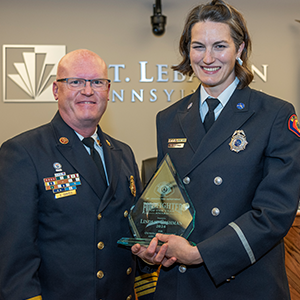is “pay as you throw” the way to go?
Michele Nestor, president of Nestor Resources, a solid waste consulting and project management company, talked to the commission last night about the feasibility of introducing a pay-as-you-throw (PAYT) trash collection system here.
PAYT programs charge residents for trash collection based on how much trash they generate. According to the Pennsylvania Department of Environmental Protection, 213 municipalities in the state have some kind of PAYT program. The benefits of this kind of system are an increase in recycling, and residents are only charged for the amount of trash they generate.
Some of the challenges are, the need for creating a new billing system to accommodate the change, and residents could perceive it as a new tax. Also, “Disposal is already cheap here,” says Nestor. “About 75 percent of the cost of disposal is fuel and labor, and those trucks are going to roll down the street every day anyway.”
Some other possibilities to promote recycling are a program called Recycle Bank, where people receive grocery coupons and other incentives for decreasing their trash footprint. A drawback, says Nestor, is that there is a cost associated with the program, approximately $15 per household per year, and in one survey, about 50 percent of residents registered, and of those, only about 10 percent used the service on a regular basis. Some communities have had success with a “secret shopper” approach, where a trash-day inspection will reward one or a few residents each week for showing good recycling practices.
“Or, you could just give out bigger bins for recycling,” says Nestor, something that could be done as part of a campaign to educate residents more about the advantages of the single-stream recycling Mt. Lebanon currently employs. Public Works Director Tom Kelley mentioned that his department often received positive feedback following stories in mtl Magazine about various aspects of recycling.
Despite the potential resistance to the program (or anything new), Nestor believes that PAYT is the way of the future.
Commissioners were open to exploring the possibilities of increasing Mt. Lebanon’s recycling output while decreasing its landfill footprint. Both Kelly Fraasch and Kristen Linfante moved here from PAYT communities, and both expressed a desire to see it work here.
Mt. Lebanon and the rest of the communities in the South Hills Council of Governments will be negotiating a new trash and recycling contract this year.
For more information about pay as you throw options, check out the EPA’s website, http://www.epa.gov/epawaste/conserve/tools/payt/index.htm.





